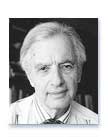   |

Robert Jay LiftonRobert Jay Lifton is a visiting professor of psychiatry at Harvard Medical School and Cambridge Hospital and a former distinguished professor of psychiatry and psychology at the Graduate School University Center and director of The Center on Violence and Human Survival at John Jay College of Criminal Justice at The City University of New York. He had previously held the Foundations' Fund Research Professorship of Psychiatry at Yale University for more than two decades. He has been particularly interested in the relationship between individual psychology and historical change, and in problems surrounding the extreme historical situations of our era. He has taken an active part in the formation of the new field of psychohistory. Dr. Lifton was born in New York City in 1926, attended Cornell University, and received his medical degree from New York Medical College in 1948. Her interned at the Jewish Hospital of Brooklyn in 1948-49, and had his psychiatric residence training at the Downstate Medical Center, Brooklyn, New York in 1949-51. He was an Air Force psychiatrist serving in the United States, Japan, and Korea from 1951-53. He was research associate in psychiatry at Harvard from 1956-61, where he was affiliated with the Center for East Asian Studies; and prior to that was a member of the faculty of the Washington School of Psychiatry. From mid-1995, he has been conducting psychological research on the problem of apocalyptic violence, focusing on Aum Shinrikyo, the extremist Japanese cult which released poison gas in Tokyo subways. His book, Destroying the World to Save It: Aum Shinrikyo, Apocalyptic Violence, and the New Global Terrorism was published by Metropolitan Books in October, 1999. His writings on Nazi Doctors (on their killing the name of healing) and the problem of genocide; nuclear weapons and their impact on death symbolism; Hiroshima survivors; Chinese thought reform and the Chinese Cultural Revolution; psychological trends in contemporary men and women; and on the Vietnam War experience and Vietnam veterans, have appeared in a variety of professional and popular journals. He has developed a general psychological perspective around the paradigm of death and the continuity of life and a stress upon symbolization and "formative process," and on the malleability of the contemporary self. Recent books include Hiroshima in America: Fifty Years of Denial, (Putnam and Avon Books, 1995) (with Greg Mitchell) which explores the impact of Hiroshima on our own country; and The Protean Self; Human Resilience in an Age of Fragmentation, (Basic Books, 1993) which describes the contemporary "protean" self and its expressions of fluidity and change as its possible relationship to species consciousness and a "species self" (related importantly to one's connection to humankind). |
| � |